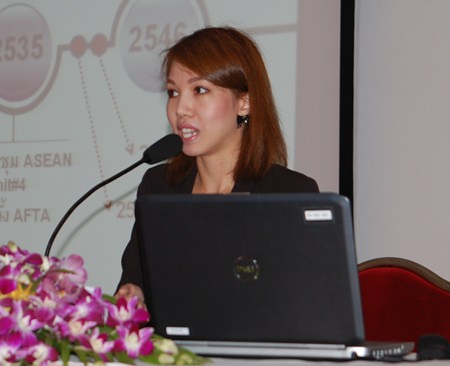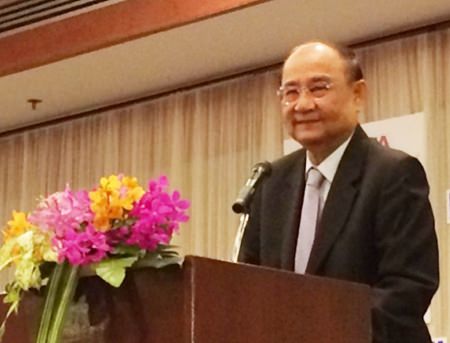|
Exporters given AEC advice at Pattaya seminar

Boochita Intaratat, an expert from the
Department of Foreign Trade, tells the seminar that free-trade agreements
are important tools for expanding the value of trade and investment, as well
as for maintaining old markets and extending trade to new ones.
Surasak Huasoon
Government trade officials offered advice for companies hoping to
expand export opportunities at an ASEAN Economic Community-focused seminar
in Pattaya.
Jaras Kittisomboonsuk, director of the Bureau of Foreign Trade Services, and
Boochita Intaratat, an expert from the Department of Foreign Trade, were the
lead speakers at the Nov. 13 seminar sponsored by Pattaya, the Ministry of
Commerce and the Department of Foreign Trade at the Montien Hotel.
The lecturers said it was a well-known fact that competition in the global
market is growing intense and Thailand has to rely more on international
trading. Thus, they said, free-trade agreements are important tools for
expanding the value of trade and investment, as well as maintaining old
markets and extending trade to new ones.
They will help the country increase its potential in exporting goods and
services and be able to lure more foreign investors to invest in the
country.
The ASEAN Free Trade Agreement preceded the start of the AEC next year.
ASEAN also signed free-trade agreements with countries from other regions to
support ever-changing global trade and to increase ASEANís leverage in
global negotiations, they said.
Currently, ASEAN has signed free-trade agreements with six nations: China,
Japan, India, Australia, New Zealand and South Korea.
Jaras said the amount of benefit Thai business operators will gain from FTAs
depends on their knowledge and understanding of it, especially of the Rules
of Origin, which lowers to zero tariffs on products proven to be grown,
produced or manufactured entirely in the country. Another variable is their
awareness of how to seek new market opportunities, he said.
|

|
Top banker warns populist policies must be implemented with care

Kosit Panpiemras, Bangkok Bank
executive chairman.
Thailandís Board of Investment (BoI) admits that foreign
investment is declining, and a top banker warns that the governmentís
economic stimulus policies will fail if its populist policies cause a rise
in household debt.
Kosit Panpiemras, Bangkok Bank executive chairman, said the governmentís
economic stimulation efforts through monetary and fiscal policies would not
bear fruit if it continued to implement populist policies in the way that
prevents household debt from falling.
He suggested that the government cooperate with the private sector to catch
up with the changes of global markets.
Thai exports are declining despite the global economic expansion.
Kosit urged the government to closely supervise production. Thailandís
economic growth rate is predicted at 3-4 percent next year due to its low
base this year, he said, noting that previous populist policies and
household debt continue to heavily affect the Thai economy and prevent its
growth from reflecting the real potential of the country.
Chokedee Kaewsang, BoI deputy secretary-general said foreign investment in
the first 10 months of this year dropped by 10 percent compared with the
same period last year because Thailand could not support the investment
projects that turned to use higher technologies.
He estimated the overall value of projects seeking BoI promotional
privileges at Bt700 billion this year, lower than the corresponding figure
last year.
The projects center on the automotive, electrical, electronic and machinery
industries. (MCOT)
|

|
FPO projects 4 percent
GDP growth next year

Thailandís Fiscal Policy Office (FPO) projects that the Thai
economy will expand by 4 percent next year due to rising
consumption in the private sector, and government spending.
FPO Deputy Director-General Ekniti Nitithanprapas said in a
seminar on the Thai economic and industrial outlook in the year
ahead, that the growth rate would result from increasing
consumption in the private sector that should likely continue in
the first quarter of next year, starting from the very low
growth rate basis this year.
Additionally, he said, oil prices were declining partly because
of Thailandís domestic energy price restructuring.
This will strengthen the publicís purchasing power, which is
also strengthened by the low unemployment rate of only 0.8
percent.
Ekniti warned that household debt caused installment burdens and
that lower prices of farm products including natural rubber were
negatively affecting the Thai economy.
What he thinks is driving the economy is government spending. He
said that only 89 percent of the 2014 budget had been disbursed
due to past political problems.
The disbursement of the remaining budget in the present fiscal
year and the spending of state enterprises would create
considerable economic activity, Ekniti said.
Energy expert Manoon Siriwan said the energy price restructuring
would limit price reduction in only gasoline and gasohol. (MCOT)
|

|
Thailand eyes becoming
regional trade centre

Deputy Prime Minister Pridiyathorn
Devakula.
The Thai government is amending laws aimed at persuading foreign
businesses to set up their regional operating headquarters in
Thailand, a move which would enable the kingdom to become a
regional trading centre like Singapore, Deputy Prime Minister
Pridiyathorn Devakula said on Friday.
He told participants attending a seminar that the amended law
would be forwarded to the cabinet for its approval early next
year.
It would help boost Thailandís gross domestic product to between
5-6 percent in the next two years and would not cause a bubble
economy in the country, he said.
The law would also help increase the role of Thailandís economy
with neighboring countries and is also designed to encourage
Thai businesses to invest internationally, said Pridiyathorn.
Development in Thailand in the past resulted from private
investment which has now reached its saturation point due to the
shortage of labor and land for investment, causing an investment
slowdown since 2010 and eventually affecting the countryís GDP
which only grew between 3-4 percent, he said.
Therefore, there is a need for amending the tax system to
facilitate foreign businesses to set up regional operating
headquarters in Thailand and to also encourage Thai businesses
to invest in abroad, Pridiyathorn said.
The government will invest in major infrastructure projects to
cater to the ďdigital economy,Ē such as establishing a massive
broadband to assist businesses, he added. (MCOT)
|

|
|

